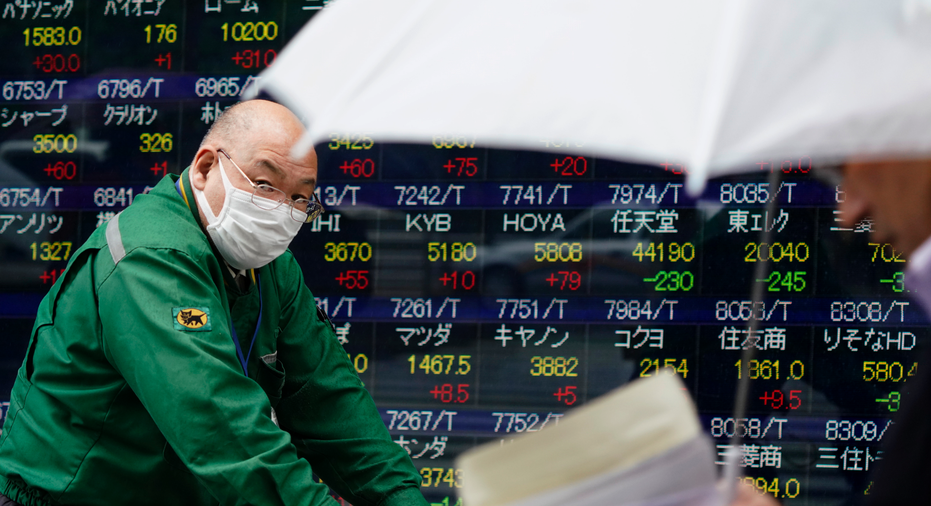Global stocks rise after Wall Street gains for 2nd day

BEIJING – Global stock markets followed Wall Street higher Wednesday despite a Chinese tariff hike on U.S. sorghum in a swelling trade dispute with Washington.
KEEPING SCORE: In early trading, London's FTSE 100 rose 0.7 percent to 7,278.02 and France's CAC 40 added 0.5 percent to 5,379.95. German's DAX advanced 0.3 percent to 12,630.42. On Tuesday, the DAX climbed 1.6 percent, the CAC 40 rose 0.8 percent and the FTSE 100 added 0.4 percent. On Wall Street, futures for the Dow Jones industrial average and Standard & Poor's 500 index gained 0.1 percent.
ASIA'S DAY: The Shanghai Composite Index gained 0.8 percent to 3,091.40 and Tokyo's Nikkei 225 rose 1.4 percent to 22,158.20. Hong Kong's Hang Seng advanced 0.7 percent to 30,284.25 and Sydney's S&P-ASX 200 added 0.3 percent to 5,861.40. Seoul's Kospi gained 1.1 percent to 2,479.98 and India's Sensex edged up 0.1 percent to 34,435.59. Benchmarks in Taiwan, New Zealand and Southeast Asia also rose.
TRADE TENSIONS: China imposed preliminary anti-dumping tariffs of 178.6 percent on U.S. sorghum. The United States told the World Trade Organization it has agreed to discuss with China the Trump administration's tariff increases on steel and other Chinese goods. President Donald Trump has threatened to raise tariffs on up to $150 billion of Chinese goods due to disputes over technology policy, market access and Beijing's trade surplus with the United States. China responded with its own list of U.S. goods for retaliation. Investors worry other governments might raise their own import barriers.
ANALYST'S TAKE: "Shares rose despite another ratcheting up of trade barriers, this time from China," Michael McCarthy of CMC Markets said in a report. "The measured response of U.S. trading partners has soothed market worries."
CHINA AUTOS: Beijing announced it would allow full foreign ownership in its auto industry in five years, ending restrictions that irked Washington and other governments. The Cabinet's planning agency said it would start by allowing full foreign ownership of producers of electric cars, with similar action later on commercial and traditional passenger vehicles. China is the biggest auto market but until now global automakers have been required to work through partnerships with state-owned partners, an arrangement that forces them to share technology with potential competitors.
U.S. ECONOMY: The International Monetary Fund upgraded its economic outlook for the United States in 2018, forecasting growth of 2.9 percent this year, up from the 2.7 percent it had forecast in January and from last year's 2.3 percent expansion. The Federal Reserve said last month's U.S. factory output rose slightly.
CHINESE ECONOMY: The world's second-largest economy grew by a stronger-than-expected 6.8 percent over a year earlier in the quarter ending in March. That was in line with the previous quarter, but activity weakened toward the end of the period. Forecasters expect growth to slow this year as Beijing tightens controls on bank lending and a real estate sales boom to curb rising deb.
JAPAN TRADE: Export growth in March edged up to 2.1 percent over a year earlier from the previous month's 1.8 percent. Imports contracted 0.6 percent from a year earlier, led by a 17 percent plunge in shipments from China. The country's global trade surplus was $7.4 billion.
ENERGY: Benchmark U.S. crude added 66 cents to $67.18 per barrel in electronic trading on the New York Mercantile Exchange. The contract gained 30 cents on Tuesday to settle at $66.52 per barrel. Brent crude, used to price international oils, rose 61 cents to $72.19 per barrel in London. It advanced 16 cents the previous session to close at $71.58 per barrel.
CURRENCIES: The dollar gained to 107.28 yen from Tuesday's 107.00 yen. The euro slipped to $1.2365 from $1.2373.



















